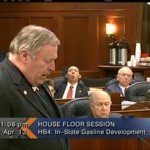What began as a lawsuit in November brought by anti-Pebble mine crusader Bob Gillam against the Alaska Public Offices Commission has seeped past the confines of the suit and now involves allegations that APOC– the agency that’s in charge of regulating campaign finance laws–has acted improperly not only with Gillam, but with others as well.
The allegations, some of which come from former APOC employees as well as court filings, range from wrongful termination to arbitrary, improper and perhaps illegal assessments of fines against Rep. Bob Herron, D-Bethel, Sen. Lyman Hoffman D-Bethel, and Republican Lt. Gov. Mead Treadwell.
One former employee said that the director of the agency, the assistant director, and the agency’s chairperson were on a “witch hunt,” against Gillam and Treadwell.
Gillam’s suit alleges among other things that APOC is biased against him and that the commission tolerates behavior that’s “pervasive and corrosive” to Gillam’s rights. It wants the agency to bow out of any further investigations against Gillam.
Gillam owns a money market firm as well as a private lodge in the Pebble area, and has devoted gallons of financial and sweat equity into fighting one of the largest proposed copper and gold mines in the world, slated to be in Gillam’s back yard. Because much of the fight has involved elections, Gillam has often appeared in front of the commission with an army of well paid lawyers who have been able to continually settle with APOC and keep his name out of court records.
Paul Dauphinais, the director of APOC, allegedly wanted to change that. According to court filings, he told Department of Administration Deputy Commissioner Curtis Thayer that the agency needed more state money to fight Gillam in order to “get” and “ruin” him.
Gillam’s firm is regulated by the U.S. Security and Exchanges Commission, which could pull Gillam’s license if he breaks state laws. Dauphinais allegedly told Thayer that he had a conversation with the SEC about Gillam and that Dauphinais wanted to prove that Gillam had broken the law.
APOC is autonomous but is housed under the Alaska State Department of Administration which reviews its budget prior to being submitted to the governor.
After the conversation with Dauphinais, Thayer went to a friend for advice about that situation. Unbeknownst to Thayer, the friend is also a lawyer for Gillam.
Gillam then filed his lawsuit and the story began to build. That story now involves former employees, and at least three state lawyers– one for Dauphinais, one for the chair of the commission Elizabeth Hickerson, and one for the Department of Administration. The Legislative Budget and Audit Committee has approved an audit of the agency as well.
Whatever comes out of the audit and the suit, one thing is for sure: turnover has been high at the agency since Dauphinais took the executive director job in February 2011. The five member commission hires the executive director, who then hires staff. Since Dauphinais took the reins, nine of 14 APOC staff have left the agency over the last 18 months. At least one of those staffers is considering suing for wrongful termination.
The Department of Administration has interviewed some of those former staff members and at least one of those exit interviews has been submitted by Gillam as evidence.
Martha Tansike, who was a staff lawyer for APOC from 2011 to 2012, said that she left the agency because Dauphinais and Assistant Director Jerry Anderson told her to file a case against Gillam. Because her husband works for a firm that represents Gillam, she told them that she had a conflict of interest and could lose her law license due to a conflict of interest. They ordered her to do so anyway.
Further, she said that Dauphinais, Jerry, and Hickerson were on a “witch hunt” against Gillam. “Paul/Jerry would go out of their way to dig up info against him,” Tansike told the interviewer.
She said Dauphinais and Anderson were also on a “witch hunt,” against Lt. Gov. Mead Treadwell, who in January was fined $3,166 for reporting violations and $3,538 in staff costs for issues related to his 2010 campaign.
“There was no evidence to support what they were asserting, but Paul/Jerry would not back down off their position,” Tansike said. “He was accused of taking discounts but he had not. It had to do with standard billing practices and they would not back down.”
Tansike could lose her bar license if she were found to be lying about her time at the agency.
Vullnet Greva, who was with the agency from 2007 until September 2012, said in an affidavit that the agency was biased against Gillam and that complaints against him were subjected to greater scrutiny than complaints against others. He said that there is an assumption that Gillam and his lawyers are “trying to hide something or are up to no good.” He believes that the commission chair Elizabeth Hickerson, “is aware of the Dauphinais’ bias and condones or approves of it.”
Sources say that another employee, whose exit interview doesn’t appear to have been filed in court, said that he or she was ordered to withhold information that might have proved helpful to Herron and Hoffman, who in September 2012, were both fined more than $7000 for failure to file complete financial disclosures.
The DOA exit interviews were sent to the five member commission. They were not discussed at the last commission meeting early in March.
Contact Amanda Coyne at amandamcoyne@yahoo.com


 The Alaska Republican Party State Executive Committee is to meet Monday evening at party headquarters in Midtown Anchorage to discuss dysfunctional party issues and what to do about the current chair, Debbie Brown. Brown’s been a continual thorn in the party’s side since she took over for ousted Russ Millette in February, who was the whole branch of thorns.
The Alaska Republican Party State Executive Committee is to meet Monday evening at party headquarters in Midtown Anchorage to discuss dysfunctional party issues and what to do about the current chair, Debbie Brown. Brown’s been a continual thorn in the party’s side since she took over for ousted Russ Millette in February, who was the whole branch of thorns.






















